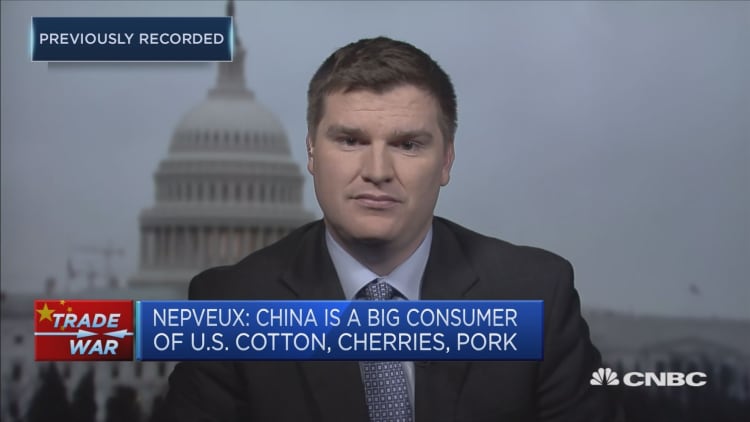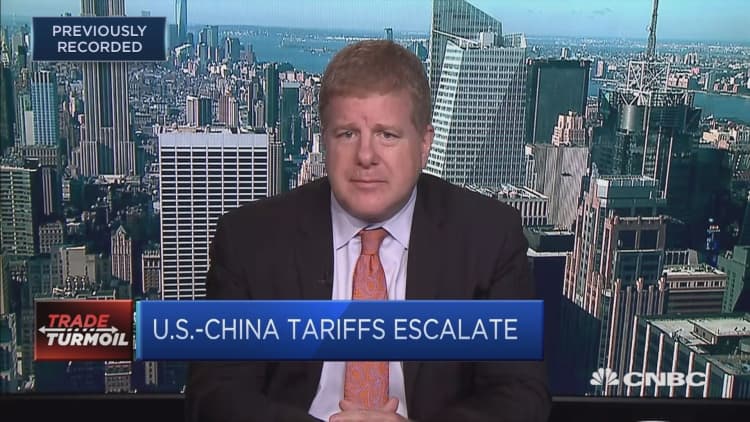
China's latest tariff hike on $60 billion worth of U.S. goods hits farmers at "every single angle," according to an economist at the American Farm Bureau Federation.
"The retaliatory tariffs placed on U.S. farmers from China are a net negative on the industry," Michael Nepveux told CNBC's "Squawk Box Asia" on Tuesday.
Ongoing U.S.-China trade tensions further escalated Monday when Beijing announced that it would raise tariffs to as high as 25% on more than 5,000 U.S. products starting June 1. The new Chinese duties target a wide range of agricultural products, and U.S. farmers are set to be hardest hit.
This is a "very, very challenging time for farmers right now," said Nepveux, especially since Beijing's tariffs come after March's historic floods in the Midwest ruined farmers' crops and stockpiles.
"We're sitting at one of the lowest net farm incomes we've seen in over a decade," he added. "(Farmers are) having huge challenges even getting out onto the field in order to try and plant."
Nepveux pointed out that the U.S. agriculture industry has already been fighting this battle for "pretty much a year."
A 'missed opportunity'
The current Chinese tariffs on U.S. pork producers will be a "huge missed opportunity" for American pork producers, especially since African swine fever — which is spreading like "wildfire" in China — has hit Chinese supplies, Nepveux said.
"Some people are saying it could easily be 20, 30% of (China's) pork production reduced as a result of African swine fever," Nepveux said. This presents a perfect opportunity for American livestock farmers – but they still face over 60% of tariffs going into China, he said.
However, this issue may also present an opportunity for the U.S. to put extra pressure on China, Nepveux said. "China is going to have to make up that protein somewhere, and U.S. pork is ready to help meet it along with other animal proteins as well."
Threatening each other is not the best way to conduct business.Myron BrilliantU.S. Chamber of Commerce
To curb the effect of Beijing's retaliatory duties, Trump on Monday said farmers would receive about $15 billion dollars in aid.
"We're gonna take the highest year, the biggest purchase that China has ever made with our farmers, which is about $15 billion dollars, and do something reciprocal to our farmers, so our farmers can do well," the president told reporters.
'High stakes poker'
In response to Beijing's new tariffs, Washington may impose another raft of levies on an additional $300 billion worth of Chinese goods. While U.S. President Donald Trump said he has not "made that decision yet," the Office of the U.S. Trade Representative is said to have taken the necessary legal procedures to make that possible.
"Threatening each other is not the best way to conduct business," according to Myron Brilliant, executive vice president and head of International Affairs at the U.S. Chamber of Commerce.

"It's very clear that the U.S. chamber has not supported the imposition of tariffs, not just in the context of China. We'd like to see it addressed with Mexico and Canada, and of course with Europe as well," Brilliant told CNBC on Tuesday.
While the U.S. Chamber is "concerned about tariff policies," Brilliant said it very much supports the administration's efforts to tackle long standing issues Washington has faced with Beijing — such as market access to China and intellectual property concerns.
Still, Brilliant said he is "bullish" on the prospects of both sides reaching an agreement, although "it's not going to get done in the time frame that we had thought it would get done."
"Just high stakes poker right now, and both sides are going to have to figure out how to blink together," he said.
— Correction: This story has been corrected to reflect that U.S. President Donald Trump announced on Monday that farmers would receive about $15 billion dollars in aid.

